牛津译林版高中英语必修五unit3scienceversusnature-Task课件
牛津译林版高中英语模块5 Unit 3 Science versus nature Project

Unit 3 Science versus nature Project 教学案1Lead-in1、Check the homework exercises2、Review some language focus in TaskReadingA. We have learned sth. about “man versus nature〞in the reading. Today we will learn sth. more about this topic. Please turn to page 58 and read the “Project〞in five minutes. Then I’ll ask you to answer some questions to see how well you understand the passage.Questions:1、What have people done to nature?(They have done a lot to destroy and damage nature.)2、If we continue in this way,what might happen?The planet we live on will be eventually destroyed.3、Which is more important,economic development or protecting nature?Why do you think so?4、What is the attitude of poorer nations towards the problem?And what about the attitude of developed nations?(Poorer nations pay more attention to economic development but less to the environment while developed nations do things in a different way.)5、Do you think the problem of humans winning and nature losing can be settled?If so,can you suggest some solutions?B. Decide whether the following are true or false:1、Endless over-development is sure to affect natural resources and destroy nature.2、Few will agree that economic development should be stopped in favor of protecting nature.3、Many developed countries have seen the effects of the careless use of Earth’s resources.4、Humans can’t really win without protecting nature.5、People should enjoy healthy and productive lives at any cost.6、People should produce food in a healthy and natural way.7、The poorer the nations are,the faster they use up their natural resources.8、There must be solutions acceptable for both humans and nature and we are sure to find them.1. T2. T3. T4. T5. F6. T7. F8. TC. Fill in the article with suitable words:People have done a lot to ___________ nature by overdeveloping Earth’s _________ and by Constructing new water channels,building new factories and creating _________ with industrial waste.Some people think that something that is best for nature may do no ______ to people. We are only doing what humans have always done,using nature to _________ our own needs.Many developed nations care to ________ nature now,while many ______ nations are still using up natural resources at a fast rate. The developing and developed countries need to ______ __________ to ensure that people enjoy healthy and productive lives without the environment around them ________ .Humans have to find solutions that everyone and everything can ________ .(damage,resources,pollution,good,meet,save,poorer,work together,suffering,accept)DiscussionThere are four paragraphs in this reading. Let’s divide our class into four groups. Each group read and discuss one group. After discussion,please report the main idea of each paragraph. Para. 1:Natural resources have been seriously affected by carelessness.Para. 2:Different attitudes towards the problem.Para. 3:Humans are moving towards an important point in the relationship with nature.Para. 4:Humans can only really win by protecting nature.Language focus1、over-:过度的、超越的over-crowded、overdo(overdid、overdone)、overdress、overflow、overheat、overcharge overtime、overweight、overwork….但:overall:全面的,overcoat:大衣,overcome:克制,overhead:在头顶、在上空overseas:海外的2、construct:1) build:建造、构建,construct sth.e.g. They are planning to construct a bridge over the river.When was the building constructed?It took more than three years to construct the Qinghai-Tibet Railway.2) 编写(文章)、造(句)、建立(理论)e.g. construct a theory,a well-constructed novelconstruction:建筑、建立:sth. be under construction:……在建立中3、in favor of:1) 赞同……、支持……e.g. The headmaster spoke in favor of the proposal..They were in favor of free trade.I’m not in favor of buying so expensive an article.2) 对……有利= in one’s favore.g. His decision is in favor of the old.The judge passed judgment in favor of the poor.The new evidence is in my favor.* do sb. a favor / do sb. the favor to do sth.* ask sb a favour = ask a favour of sb.4、argue:argue with sb. over / about sth.argue sb. into / out of doing sth.:说服某人做/ 停顿做某事。
牛津译林版高中英语必修五unit3scienceversusnature-welcome课件

(金戈铁骑 整理制作)
Science Versus Nature
VS
Why is‘v‘veresurss’uissu’suualslyeudsehd ere?
Do you thwinhkenthdeirseciusscsoinngfliscpt obretstween science acnodmnpaettuitrieo?ns or the law, What migwhhtitchhemcoenafnlisctthbae?t two teams
Hi! I’m Joy. I’m happy-go-
lucky everyday.
I’m your Star.
Love me please.
Just call me Noel,
OK?
I’m the beautiful
Mary
I’ m Angel, in your heart
The pair of calves were born on 5 July 1998 in Ishikawa, Japan. They were two years younger than Dolly, being the second adult animal clones in the world.
Form groups of four or six to discuss the further questions:
1. From just these pictures, can you identify the differences between the cloned animals and normal ones? 2. In your opinion, what might be the differences between these cloned animals and normal ones? Can these animals lead a normal life as normal animals? 3. Ask several groups to report their answers to the class. Allow different opinions and encourage further discussion.
高中英语译林牛津版必修五Unit 3 Science versus nature project课件

GM food
• What is GM food?
➢ food that has been genetically modified
•
How is food genetically modified?
1.
To insert new material into its DNA;
2. To take undesired material from its DNA
GM food could be unsafe for the environment.
GM food
Hope
Danger
GM plants are able to defend themselves against pests and disease better.
GM plants are healthier and have larger harvest.
GM food could be dangerous for people to eat.
Read it again and answer the following questions.
1. What have people done to nature? 2. If we continue in this way, what might happen? 3. What different attitudes towards environmental conservation?
3. What different attitude towards environmental conservation? One side: If we focus only on environmental conservation, then people may suffer. Should the economic development be stopped in favor of nature? We are only doing what humans have always done, using nature to meet our needs. The other side:
牛津译林版高中英语模块5 Unit 3 Science versus Nature Writing
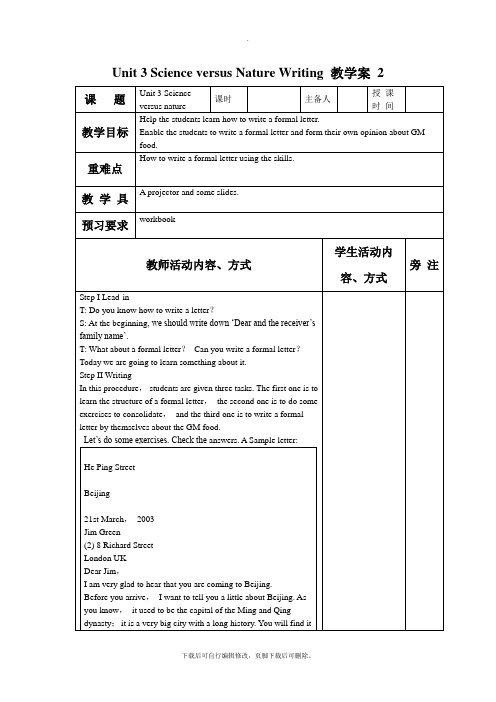
Let’s do some exercises. Check theanswers. ASample letter:
He Ping Street
Beijing
21st March,2003
Jim Green
(2) 8 Richard Street
London UK
Dear Jim,
I am very glad to hear that you are coming to Beijing.
S: At the beginning,we should write down ‘Dear and the receiver’s family name’.
T: What about a formal letter?Can you write a formal letter?Today we are going to learn something about it.
重难点
How to write a formal letter using the skills.
教学具
A projector and some slides.
牛津译林版高中英语必修5Unit 3Science versus natureTask教案2
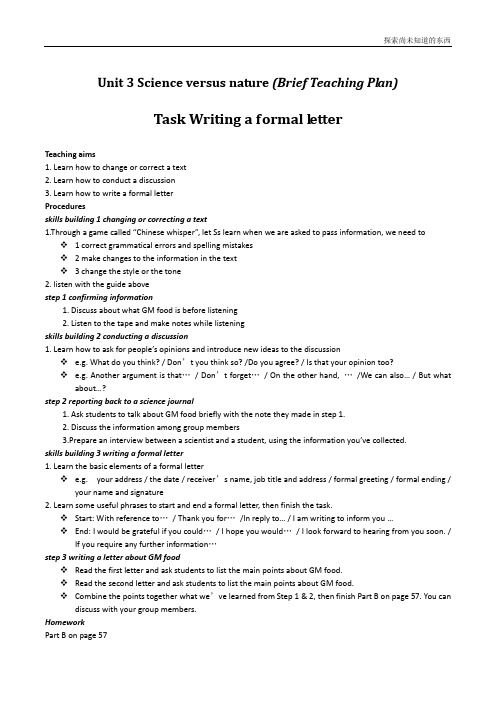
Unit 3 Science versus nature (Brief Teaching Plan)Task Writing a formal l etterTeaching aims1. Learn how to change or correct a text2. Learn how to conduct a discussion3. Learn how to write a formal letterProceduresskills building 1 changing or correcting a text1.Through a game called “Chinese whisper”, let Ss learn when we are asked to pass information, we need to❖ 1 correct grammatical errors and spelling mistakes❖ 2 make changes to the information in the text❖ 3 change the style or the tone2. listen with the guide abovestep 1 confirming information1. Discuss about what GM food is before listening2. Listen to the tape and make notes while listeningskills building 2 conducting a discussion1. Learn how to ask for people’s opinions and introduce new ideas to the discussion❖ e.g. What do you think? / Don’t you think so? /Do you agree? / Is that your opinion too?❖ e.g. Another argument is that…/ Don’t forget…/ On the other hand, …/We can also… / But what about…?step 2 reporting back to a science journal1. Ask students to talk about GM food briefly with the note they made in step 1.2. Discuss the information among group members3.Prepare an interview between a scientist and a student, using the information you’ve collected.skills building 3 writing a formal letter1. Learn the basic elements of a formal letter❖ e.g. your address / the date / receiver’s name, job title and address / formal greeting / formal ending / your name and signature2. Learn some useful phrases to start and end a formal letter, then finish the task.❖Start: With reference to…/ Thank you for…/In reply to… / I am writing to inform you …❖End: I would be grateful if you could…/ I hope you would…/ I look forward to hearing from you soon. / If you require any further information…step 3 writing a letter about GM food❖Read the first letter and ask students to list the main points about GM food.❖Read the second letter and ask students to list the main points about GM food.❖Combine the points together what we’ve learned from Step 1 & 2, then finish Part B on page 57. You can discuss with your group members.HomeworkPart B on page 57。
牛津译林版高中英语必修五unit3scienceversusnature-wordpower课件

1) n. 好感,欢心 win sb’s favor 赢得某人的欢心
favor
2) n. 恩惠 do sb. a favor= do a favor for sb.
帮某人一个忙
May I ask a favor of you?
hardship, scholarship, relationship
state of being, skill
-dom freedom, kingdom,conΒιβλιοθήκη ition or state of…
-ish childish, selfish
of the nature of…
-proof waterproof, fireproof, soundproof protect against
2) : exercise 锻炼,运动
work on从事某项工作,继续工作 work at学习,研究,致力于; 在...下功夫
他正在撰写一本新词典.
H我e正is在w努or力ki学ng习o.n a new dictionary. I’m working at my study.
2.opposedto opposed adj. 反对的,对抗的,对立的
1)You cannot find your new pen. What happened to your pen? It disappeared 2) Many people respect Mr. Li and think he is a good man. He helps people out and is a good citizen and friend. So can you find a word to describe Mr. Li? Respectable 3) Miss Wang has published several books. She loves her job writing novels. So what is Miss Wang’s occupation(职业)? She is a novelist 4) You cannot find the order of the numbers in a group of members. So can you find a word to describe the order of the numbers? irregular
牛津译林版高中英语模块5 Unit 3 Science versus Nature Reading
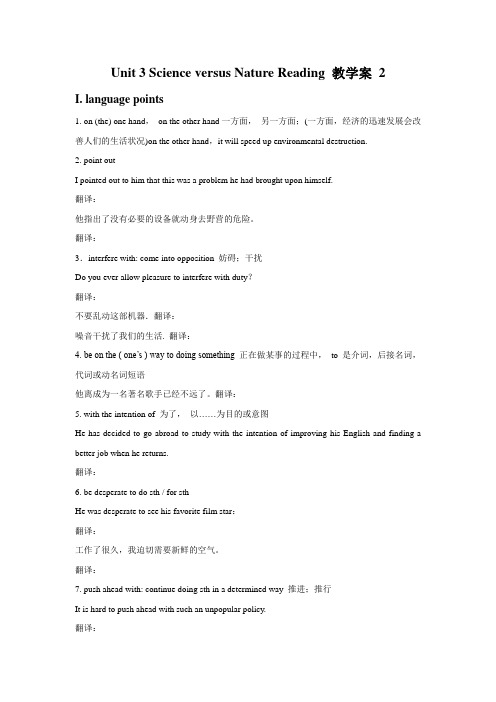
Unit 3 Science versus Nature Reading 教学案2I. language points1. on (the) one hand,on the other hand一方面,另一方面;(一方面,经济的迅速发展会改善人们的生活状况)on the other hand,it will speed up environmental destruction.2. point outI pointed out to him that this was a problem he had brought upon himself.翻译:他指出了没有必要的设备就动身去野营的危险。
翻译:3.interfere with: come into opposition 妨碍;干扰Do you ever allow pleasure to interfere with duty?翻译:不要乱动这部机器.翻译:噪音干扰了我们的生活. 翻译:4. be on the ( one’s ) way to doing something 正在做某事的过程中,to 是介词,后接名词,代词或动名词短语他离成为一名著名歌手已经不远了。
翻译:5. with the intention of 为了,以……为目的或意图He has decided to go abroad to study with the intention of improving his English and finding a better job when he returns.翻译:6. be desperate to do sth / for sthHe was desperate to see his favorite film star:翻译:工作了很久,我迫切需要新鲜的空气。
翻译:7. push ahead with: continue doing sth in a determined way 推进;推行It is hard to push ahead with such an unpopular policy.翻译:即使遇到再大的困难,我们也要按计划行事.翻译:8. focus…on: 1) come together at a point聚焦2)concentrate集中Focus the sun’s ray on sth and it will burnThe government should focus its efforts on economy.上课时,学生应集中注意力听老师讲课.During class,every student should focus their attention on the teacherFocus attention/thoughts/efforts on9. end up: 以……告终end up with/ inend up doingend up+adj.If you continue to steal you will end up in prison.If he carries on driving like this,he will end up dead.At first he refused to accept any responsibility ,but he end up apologizing.10. comment on/ upon make comments on / upon .II PracticeFill in the blanks with the phrases belowpush ahead with;in general;benefit from ;figure out;for sale;point out;show respect for;deal with;end up;use up1.At first they hated each other,but they________getting married.2. The government is _____its reform r egardless of people’s objection3. I can’t ________ why he quit his job.4._______the old and taking care of the young is the Chinese tradition5. Don’t________ all the glue. I need some.6. She is used to __________all kinds of people in her career.7. I should ___________that none of the paintings is original.。
牛津译林版高中英语必修五Unit3scienceversusnature-Project课件

Thank you !
Preparing
• Discuss the collected information and tick the strong points to be the start and the end.
• Make a list of all your points.
• Think about the opposite points and think about how to argue against them.
• Display your research on the wall when debating.
• Make rules of winning before the debate and check which group wins at the end.
Homework
Write an essay on any topic that you’re interested in by using the techniques you learned from a debate.
Planning
• Choose a topic that interests you • Split into For and Against • Assign roles and tasks • Use different medias to search
for relevant information
1. What have people done to nature?
2.If we continue in this way, what might happen?
3. Which is more important, economic development or protecting nature?
译林牛津版 必修五 Unit 3 Science versus Nature - Reading 教案

Unit 3 Science versus Nature 教案The Perfect CopyTeaching goals:1. Learn more about cloning technology and its uses2.get students to learn different opinions on cloning and form their own views about it3.improve students’ abilities of getting the meaning s of key words and expressions according to contexts4.practice reading skills in this unitTeaching difficult and important points:1. how to figure out the points of views hold by different persons mentioned in the text 2. how to form own views about some topics clearly and support them with argumentsTeaching methods Listening, skimming, scanning and debateTeaching aids a tape recorder a projector and a computerTeaching procedures:Step 1: lead inT: Hello! boys and girls. last class we learned what is clone. clone is an exact copy of a plant or an animal. I have some pictures about cloning here. Let’s look at them one by one.(show the pictures to the students)Picture 1: Noah, the first cloned endangered gaur.Gaur is a kind of endangered Asian ox. Noah is the first cloned gaur, born on January 8th.2001. Unfortunately, Noah died two days later. The experiment proved that it was possible to save endangered species through cloning.Picture 2: a post of the latest film named X-men: The last standThe latest scientific film X-men: The last stand is about some genetically changed humans. Some of them intend to control the whole natural human s’ world with their special power while others try their best to prevent them. It is hard to imagine what the world would become, if the crazy genetically changed humans were not controlled.Step 3: Before the first reading, show the students the reading strategies on the screen and explain some reading skills in this unit. The following teaching procedures are designed to practice these skills. First, ask the students to skim the passage and two letters, then do exercise A and C1 on the text book.Step 4: first readingStep 5: Second readingT: when we are reading a passage. It is very usual to meet some new words and expressions. Some are very important for us to understand the text. Some are not so important. Pay attention to the key words and expressions and try our bests to guess their meanings in their contexts. 写出重要的生词Step 6: third readingAsk students to read the article and two letters again and find the reasons why people are anti- or pro- cloning in the article then write down the reasons in the following table.Step 8: debateT: After reading the text, we know that there are different attitudes towards cloning among people. I think you have your own point of view about it. Now here’s a topic for us to have a debate.Topic: Do you think it is a good thing that some scientists are pushing ahead with cloning human embryos?(Students are divided into two groups according to their different attitudes towards the topic, give both groups five minutes to discuss and write down the reasons for their arguments. At last several members of each group are asked to debate with the opposite ones, using the reasons they worked out before. After the debate, give some comments on their performance of both groups.Step 10: homework1. Finish exercise D and E in the text book.2. Write an essay about cloning human beings according to the questions in step 8.Step 11: conclusionT:If cloning stands for the science, then non-cloning stands for nature. They seem to be the opposite concepts. On the one hand, mankind should develop the science; on the other hand we also have to respect nature. How to balance the two sides means what the future of mankind will be. Paying attention to the problem is the task not only of the scientists but also of whole mankind.。
牛津译林版高中英语模块5 Unit 3 Science versus Nature Project
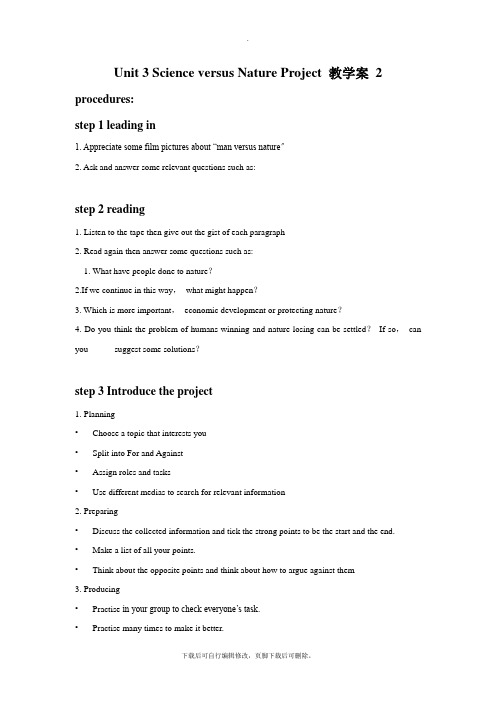
Unit 3 Science versus Nature Project 教学案2 procedures:step 1 leading in1. Appreciate some film pictures about “man versus nature〞2. Ask and answer some relevant questions such as:step 2 reading1. Listen to the tape then give out the gist of each paragraph2. Read again then answer some questions such as:1. What have people done to nature?2.If we continue in this way,what might happen?3. Which is more important,economic development or protecting nature?4. Do you think the problem of humans winning and nature losing can be settled?If so,can you suggest some solutions?step 3 Introduce the project1. Planning•Choose a topic that interests you•Split into For and Against•Assign roles and tasks•Use different medias to search for relevant information2. Preparing•Discuss the collected information and tick the strong points to be the start and the end. •Make a list of all your points.•Think about the opposite points and think about how to argue against them3. Producing•Practise in your group to check everyone’s task.•Practise many times to make it better.•Decide the time of each section.4. Presenting•Present the debate in front of class.•Display your research on the wall when debating.•Make rules of winning before the debate and check which group wins at the end.step 4 HomeworkWrite an essay on any topic that you’re interested in by using the techniques you learned from a debate.1. He was in low spirits and even consider ________________ (go) away.2. Practise ________________ (put) your hand to the ground.3. I can’t help ________________ (have) the trip to Britain.4. Don’t tell me you always escape ________________ (fine) because you have a fast sports car.5. Leave off ________________ (bite) your nails!6. H e didn’t feel like ________________ ( work ),so he suggested ________________ ( spend ) the day in the garden.7. You certainly mustn’t miss ________________ (see) the wonderful film.8. The doctor advised ________________ (stay) longer in hospital.9. We appreciate your _________ (offer) _________ (help) us in our difficulties.10. Michael has delayed ________________ (write) to her till today.11. The law forbids ________________ (sell) liquor to children.12. They all suggested ________________ (give) more chances.13. Can you imagine ________________ (leave) standing outside for a whole night?14. They built the banks to prevent the area from ________________ (flood).II.1. I used to see these boys ________________ (play) on the playground.2. I saw them ________________ (play) the computer this afternoon.3. She was surprised to find the house _________ (break) into when she went back home.4. Unfortunately, he got his wallet _________ (steal) on the bus.5. He won’t have us ________ (criticize) him.。
牛津译林版高中英语必修5湖南省岳阳县Unit 3 Science versus naturePeriod 3 Word power示范教案
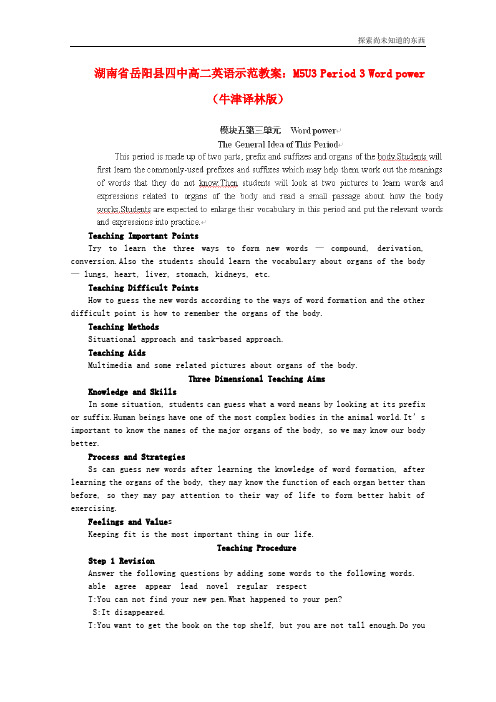
湖南省岳阳县四中高二英语示范教案:M5U3 Period 3 Word power(牛津译林版)Teaching Important PointsTry to learn the three ways to form new words —compound, derivation, conversion.Also the students should learn the vocabulary about organs of the body — lungs, heart, liver, stomach, kidneys, etc.Teaching Difficult PointsHow to guess the new words according to the ways of word formation and the other difficult point is how to remember the organs of the body.Teaching MethodsSituational approach and task-based approach.Teaching AidsMultimedia and some related pictures about organs of the body.Three Dimensional Teaching AimsKnowledge and SkillsIn some situation, students can guess what a word means by looking at its prefix or suffix.Human beings have one of the most complex bodies in the animal world.It’s important to know the names of the major organs of the body, so we may know our body better.Process and StrategiesSs can guess new words after learning the knowledge of word formation, after learning the organs of the body, they may know the function of each organ better than before, so they may pay attention to their way of life to form better habit of exercising.Feelings and Value sKeeping fit is the most important thing in our life.Teaching ProcedureStep 1 RevisionAnswer the following questions by adding some words to the following words.able agree appear lead novel regular respectT:You can not find your new pen.What happened to your pen?S:It disappeared.T:You want to get the book on the top shelf, but you are not tall enough.Do youthink you will be able to reach the book?S:I am unable to do so.T:The two groups at the meeting don’t agree with each other.They argued fiercely.So what is the problem between them called?S:Disagreed.T:Many people respect Mr.Li and think he is a good man.He helps people out and is a good citizen and friend.So can you find a word to describe,Mr.Li?S:Respectable.T:Miss has published several books.She loves her job writing novels.So what is Miss Wang’s occupation?S:She is a novelist.T:You can not find the order of the numbers in a group of numbers.So can you find a word to describe the order of the numbers?S:It is irregular.T:Some ads say that if you take their pills, you will be healthy, look younger, become smarter and sleep better.What can you say about this kind of ads?S:They are misleading.Step 2 Prefixes and suffixesT:Look at Page 46.There are two tables about prefixes and suffixes and their meanings.Work in pairs and read the examples to each other.You need to explain the meanings of the sample words in your own words to your partners.T:Work out in pairs and find more examples add to the tables.We will hold a competition in five minutes.The pair with the most correct examples wins.T:Finish the exercises on Page 46 individually.You should understand the passage and the exact meanings of the prefixes and suffixes.Answers:1) illegal2) disrespect3) hopeless4) uncertain5) understandableT:You’ll be divided into several groups and make a list of prefixes and suffixes and meanwhile give some more examples.T:Teacher give more prefixes and suffixes for the students to know:1.There are some other prefixes which can be used to represent opposite meanings of the original words.de- decompose declassify mal- maltreatment malnutritionnon- non-smoker non-alcoholic non-profit2.There are some other prefixes which are widely used in English.auto- automaker automobile bi- bilingual bilateraldown- downhill downstairs downwardsever- everlasting evergreen evermorehalf- halfway halfbaked half-pay full- full-color full-size full-page hand- hand-made hand-picked hand-washpost- postgraduate post-industrial over- overeat overdue overworkmid- midday midlife midnight3.Suffixes that are used commonly are as follows:-al cultural national original -ent different dependent existent-ian Canadian Belgian -like childlike dreamlike lifelike-proof waterproof soundproof bulletproof-en widen sharpen shortenStep 3 Organs of the bodyT:Look at the pictures of the body in Part B on Page 47.Pronounce each organ correctly and know what they each refer to.S:Try to revise what they have learned about the different expressions about organs.One student can act as a teacher, pointing to any part of his or her body and the rest pronounce the organ.S:Read the passage in Part B on Page plete the passage individually.Answers:1) brain2) heart3) liver4) lung5) stomach6) kidneysT:Ask the students to complete Part C in pairs or groups.Step 4 HomeworkTry to remember the names of the organs of the body, then read the article in Part A on Page 113 in Workbook.The Design of the Writing on the BlackboardUnit 3 Science versus natureThe third periodword formation— compound, derivation, conversionderivation—prefix, suffix,prefixes—anti-,dis-,in-,il-,im-,ir-,pre-,pro-,re-,un-suffixes—able, -ful, -ist, -less, -ment, -nessorgans of the body—brain, lungs, heart, liver, stomach, shoulder, etc.Records after Teaching________________________________________________________________________________________________________________________________Activities and Research1.Students are supposed to think of more prefixes and suffixes and give moreexamples.Also they are supposed to develop the ability to guess the new words which are formed according to the rules of word formation.2.Make a brief conclusion about the organs of their body, and know the importance of keeping healthy.Reference for Teaching英语构词法知识——常见的前缀和后缀1.表示否定意义的前缀1)纯否定前缀dis- dishonest in-, ig-, il, im, ir, incapable, inability, ignoble, impossible, immoral, illegal irregularne-, n-, none, neither, nevernon-, nonsenseneg-, neglectun- unable, unemployment2)表示错误的意义male-, mal-, malfunction, maladjustment(失调)mis-, mistake, mislead3)表示反动作的意思de-, defend, demodulation(解调)dis-, disarm, disconnectun-, unload, uncover4)表示相反,相互对立意思anti-, ant- antiknock(防震), antiforeign(排外的)contra-, contre-, contro-, contradictioncounter-, counterreaction, counterbalanceob-, oc-, of-, op-, object, oppose, occupywith-, withdraw, withstand2.表示空间位置、方向关系的前缀1)a- 表示“在……之上”“向……” aboard, aside2)by- 表示“附近,邻近,边侧” bypath, bypass(弯路)3)circum-, circu-, 表示“周围,环绕,回转” circumstance, circuit4)de-, 表示“在下,向下” descend, degrade5)en-, 表示“在内,进入” encage, enbed(上床)6)ex-, ec-, es-, 表示“外部,外”exit, eclipse, expand, export7)extra-, 表示“额外”extraction (提取)8)fore- 表示“在前面” forehead, foreground9)in-, il-, im-, ir-, 表示“向内,在内,背于” inland, invade, inside, import10)inter-, intel-, 表示“在……间,相互”international, interaction, Internet11)intro-, 表示“向内,在内,内侧” introduce12)medi-, med-, mid-, 表示“中,中间” Mediterranean, midposition13)out-, 表示“在上面,在外部,在外” outline, outside, outward14)over-, 表示“在上面,在外部,向上” overlook, overhead, overboard15)post-, 表示“向后,在后边,次” postscript(附言)16)pre-, 表示“在前”在前面”prefix, preface, preposition17)pro-, 表示“在前,向前” progress, proceed18)sub-, suc-, suf-, sug-, sum-, sup-, sur-, sus-, 表示“在下面,下” subway, submarine, suffix, suppress, supplement19)super-, sur-, 表示“在……之上” superficial, surface, superstructure20)trans-, 表示“移上,转上,在那一边” translate, transform, transoceanic21)under-, 表示“在……下面,下的” underline, underground, underwater22)up-, 表示“向上,向上面,在上” upward, uphold, uphill(上坡)3.表示时间,序列关系的前缀1)ante-, anti-, 表示“先前,早于,预先” antecedent, anticipate2)ex-, 表示“先,故,旧” expresident, exhusband3)fore-, 表示“在前面,先前,前面”foreward, forecast, foretell(预言)4)mid-, medi-, 表示“中,中间” midnight, midsummer5)post-,表示“在后,后”postwar6)pre-, pri-, 表示“在前,事先,预先”preheat, prewar, prehistory7)pro-, 表示“在前,先,前” prologue(序幕),prophet(预言家)8)re-,表示“再一次,重新”retell, rewrite4.表示比较程度差别关系的前缀1)by-, 表示“副,次要的”byproduct, bywork(副业)2)extra-,表示“超越,额外”extraordinary3)hyper- 表示“超过,极度” hypersonic(超声波), hypertesion(高血压)4)out-,表示“超过,过分”outdo(超过), outbid(出价过高的人)5)over-,表示“超过,过度,太” overeat, overdress, oversleep6) sub-, suc-, sur-, 表示“低,次,副,亚”subeditor, subordinate, subtropical(亚热带)7)super-, sur- 表示“超过” supernature, superpower, surplus, surpass8)under-,表示“低劣,低下” undersize, undergrown, underproduction(生产不足)9)vice- 表示“副,次” vicepresident, vicechairman5.表示共同,相等的前缀1)com-, cop-, con-, cor-, co- 表示“共同,一起”connect, combine, collect, combat, coexist, co-operate2)syn-, syl-,sym-,表示“同,共,和,类” symmetry, sympathy, synthesis(合成)6.表示整个完全的前缀1)al- 表示“完整,完全” alone, almost,2) over-表示“完全,全” overall, overflow(充满)3) pan-表示“全,总,万” panentheism(泛神论),panorama7.表示分离,离开的前缀1)a- ab-, abs-,表示“分离,离开” away, apart, abstract, abstain2)de- 表示“离去,除去” depart, decolour3)dis-, di-, dif-, 表示“分离,离开” divorce, disarm(缴械)4)ex-, e-, 表示“离开,分离” expel, exclude, expatriate(驱出国外)5)for- 表示“离开,脱离” forget, forgive6)表示“离开” r elease, resolve7)表示“分离,隔离” separate, seduce, select8.表示通过,遍及的前缀1)dia-,表示“通过,横过” diameter, diagram2)per-, pel-, 表示“通,总,遍” perfect, perform, pervade(浸透)3)trans-, 表示“横过,贯通” transparent, transmit, transport9.表示加强的前缀1)a-, arouse, ashamed2)ad-, adjoin, adhere( 粘着)10.表示数量关系的前缀1)mon-, mon- 表示“单一”,“一”monotone(单调),monopoly, monarch uni-, un-, uniform, unicellular(单细胞)2)表示“二,两,双” ambi- ambiguous, amphibian(两栖类)bi-, bin- bicycle, di-, diode(二级管),twi-, twilight3)deca, deco-, dec- deci-,表示“十” decade, deci mals4)hecto-, hect-, 表示“百,百分子一” centi-, hectometer,centimeter5)表示“千,千分子一” kilo-, kilometer6)表示“半,一半” hemi-, hemisphere demi-, demiofficial semi-, semiconductor, semitransparent pene-, pen-, peninsula11.表示术语的前缀1)aud-, 表示“听,声” audience2)bio-, 表示“生命,生物” biography(传记)3)ge-, 表示“地球,大地” geography4)phon-, 表示“声,音调” phonograph5)tele-, 表示“远离” television, telephone二、常见的后缀1.名词后缀(1)具有某种职业或动作的人1)-an, -ain, 表示“……地方的人,精通……的人”American, historian2)-al, 表示“具有……职务的人” principal3)-ant,-ent, 表示“……者” merchant, ag ent, servant, student4)-ar, 表示“……的人” scholar, liar, peddler5)-ard, -art, 表示“做……的人”coward, laggard, braggart(夸张者)6)-arian, 表示“……派别的人,……主义的人”humanitarian, vegetarian7)-ary, 表示“从事……的人” secretary, missionary8)-ant, 表示“具有……职责的人” candidate, graduate9)-ator, 表示“做……的人” educator, speculator(投机者)10)-crat, 表示“某种政体,主义的支持者” democrat, bureaucrat11)-ee, 表示“动作承受者” employee, examinee12)-eer, 表示“从事于……人” engineer, volunteer13)-er, 表示“从事某种职业的人, 某地区,地方的人” banker, observer, Londoner, villager14)-ese, 表示“ ……国人,……地方的人”J apanese, Cantonese15)-ess, 表示“阴性人称名词”,actress, hostess, manageress16)-eur, 表示“……家” amateur, littérateur17)-ian, 表示“……地方人,信仰……教的人,从事……职业的人”Christian,physician(内科医生),musician18)-ician, 表示“精通者,……家”electrician, magician, technician19)-icist, 表示“……家,……者,……能手”physicist, phoneticist, technicist20)-ic, 表示“……者,……师” mechanic, critic21)-ie, 表示“爱,指小” dearie, auntie, lassie(小姑娘)22)-ier, 表示“从事……职业” cavalier, clothier, brazier(黄铜匠)23)-ine, ian, 表示“阴性人称” heroine, ballerina24)-ist, 表示“从事……研究者,信仰……主义者” pianist, co mmunist, dentist, artist, chemist25)- ive, 表示“动作者,行为者” native, captive26)-logist, 表示“……学家,研究者” biologist, geologist(地质学家)27)-or, 表示“……者” author, doctor, operator28)-ster, 表示“做……事情的人”youngster, gamester(赌徒),songster29)-yer, 表示“从事……职业者” lawyer(2)构成,具有抽象名词的含义1)-acy, 表示“性质,状态,境遇” accuracy, diplomacy2)-age, 表示“状态,行为,身份及其结果,总称” courage, storage, marriage3)-al, a) 表示“事物的动作,过程”refusal, arrival, survival, denial, approvalb) 表示具体的事物manual, signal, editorial, journal4)-ance, -ence表示“性质,状况,行为,过程,总量,程度” endu rance, importance, diligence, difference, obedience5)-ancy, -ency, 表示“性质,状态,行为,过程” frequency, urgency, efficiency6)-bility, 表示“动作,性质,状态” possibility, feasibility7)-craft, 表示“工艺,技巧” woodcraft, handicraft, statecraft(治国策)8)-cracy, 表示“统治,支配” bureaucracy, democracy9)-cy, 表示“性质,状态,职位,级别” bankruptcy(破产),supremacy10)-dom, 表示“等级,领域,状态” freedom, kingdom, wisdom11)-ery, -ry, 表示“行为,状态,习性” bravery, bribery, rivalry12)-ety, 表示“性质,状态” variety, dubiety(怀疑)13)-faction, -facture, 表示“作成,……化,作用” satisfaction, manufac ture14)-hood, 表示“资格,身份, 年纪,状态” childhood, manhood, falsehood15)-ice, 表示“行为,性质,状态” notice, justice, service16)-ine, 表示“带有抽象概念” medicine, discipline, famine17)-ing, 表示“动作的过程,结果” building, writing, learning18)-ion, -sion, -tion, -ation, -ition, 表示“行为的过程,结果,状况” actionsolution, conclusion, destruction, expression, correction19)-ise, 表示“性质,状态” exercise, merchandise(商业)20)-ism, 表示“制度,主义,学说,信仰,行为” socialism, criticism, colloquialism, heroism21)-ity, 表示“性质,状态,程度” purity, reality, ability, calamity22)-ment, 表示“行为,状态,过程,手段及其结果” treatment, movement, judgment, punishment, argument23)-mony, 表示“动作的结果,状态” ceremony, testimony24)-ness, 表示“性质,状态,程度” goodness, kindness, tiredness, friendliness25)-or, -our, 表示“动作,性质,状态” favor, error,26)-osity, 表示“动作,状态” curiosity27)-ship, 表示“情况,性质,技巧,技能及身份,职业” hardship, membership, friendship28)-th, 表示“动作,性质,过程,状态” depth, wealth, truth, length, growth29)-tude, 表示“性质,状态,程度” latitude, altitude(海拔)30)-ure, 表示“行为,结果” exposure, pressure, failure, procedure(手续)31)-y, 表示“行为的结果,状态,性质” glory, history, victory, inquiry(3)带有场所,地方的含义1)-age, 表示“住所,地点” village, cottage2)-ary, 表示“住所,场地” library, granary (谷仓)3)-ery, ry, 表示“工作场所,饲养所,地点” laundry, nursery, surgery(手术室)4)-ory, 表示“工作场所,住处” factory, dormitory, laboratory, observatory(4)带有学术,科技含义1)-grapy, 表示“……学,写法” biography, calligraphy, geography2)-ic, ics, 表示“……学……法” logic, mechanics, optics, electronics3)-ology, 表示“……学……论”biology, zoology, technology(工艺学)4)-nomy, 表示“……学……术” astronomy, economy, bionomy(生态学)5)-ery, 表示“学科,技术” chemistry, c ookery, machinery6)-y, 表示“……学,术,法” photography, philosophy(5)表示人和事物的总和,集合含义1)-age, baggage, tonnage2)-dom, newspaperdom(新闻界)3)-hood, neighbourhood, womanhood4)-ery, cavalry, ministry(内阁)5)-ure, legislature, judicature(6)表示物品和物质名称的含义1)-ant, ent, solvent, constant2)-al, signal, pictorial(画报)3)-ar, collar, pillar(石柱)4)- er, boiler, computer, washer, cooker5)-ery, drapery(绸缎)6)-ing, clothing, matting,7)-ment, instrument, equipment, attachment(7)表示“细小”的含义1)-cle, particle,2)-cule, molecule(分子)3)-el, parcel4)-en, chicken, maiden5)-et, pocket, ticket6)-etta, -ette, etto, cigarette, essayette(短文)7)-kin, napkin8)-ling, duckling,9)-let, booklet10)-y, baby, doggy2.形容词后缀(1)带有“属性,倾向,相关”的含义1)-able, -ible, movable, comfortable, applicable, visible, responsible2)-al, natural, additional, educational3)-an, ane, urban, suburban, republican4)-ant, -ent, distant, important, excellent5)-ar, similar, popular, regular6)-ary, military, voluntary7)-ice, -atie, ical, politic, systematic, historic, physical8)-ine, masculine, feminine, marine9)-ing, moving, touching, daring10)-ish, foolish, bookish, selfish11)-ive, active, impressive, decisive12)-ory, satisfactory, compulsory13)-il, -ile, -eel, fragile, genteel(文雅的)(2) 表示“相像,类似”的含义1)-ish, boyish, childish2)-esque, picturesque3)-like, manlike, childlike4)-ly, manly, fatherly, scholarly, motherly5)-some, troublesome, handsome6)-y, milky, pasty(3) 表示“充分的”含义1)-ful, beautiful, wonderful, helpful, truthful2)-ous, dangerous, generous, courageous, various3)-ent, violent(4) 表示由某种物质形成,制成或生产的含义1)-en, wooden, golden, woolen2)-ous, gaseous3)-fic, scientific(5) 表示方向的含义1)-ern, eastern, western2)-ward, downward, forward(6) 表示“倍数”的含义1)-ble, double, treble2)-ple, triple3)-fold, twofold, tenfold(7) 表示“数量关系”的含义1)-teen, thirteen2)-ty, fifty3)-th, fourth, fiftieth(8) 表示国籍,语种,宗教的含义1)-an, Roman, European2)-ese, Chinese3)-ish, English, Spanish(9) 表示“比较程度”的含义1)-er, greater2)-ish, reddish, yellowish3)-est, highest4)-most, foremost, topmost(10)其他的含义-less, 表示否定countless stainless wireless3.动词后缀1)-ize, ise, 表示“做成,变成,……化”modernize, mechanize, democratize, organize2)-en, 表示“使成为,引起,使有” quicken, weaken, soften, harden3)-fy, 表示“使……化, 使成”beautify, purify, intensify, signify, simplify4)-ish, 表示“使,令” finish, abolish, diminish, establish5)-ate, 表示“成为……,处理,作用” separate, operate, indicate4.副词后缀1)-ly, possibly, swiftly, simply2)-ward, -wards, downward, inwards, upward3)-ways, always, sideways4)-wise, otherwise, clockwiseLanguage pointssimilar:adj.looking or being almost, but not exactly, the same:My father and I have similar views on politics.我和父亲政治观点差不多。
牛津译林英语必修5- Unit3 Science versus nature
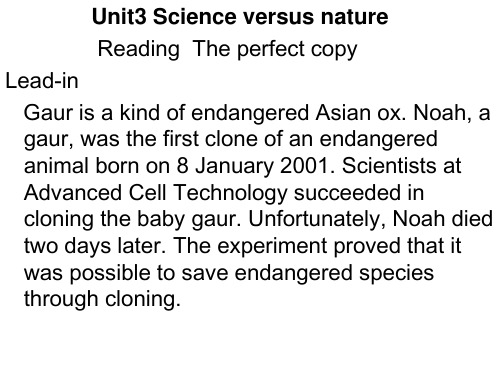
Faye Wilson, a woman of 41 years old who cannot have a baห้องสมุดไป่ตู้y. She is desperate to have a baby of his own, a child that is genetically related to her.
Severino Antinori, an Italian doctor, who is one of the leaders in the cloning research. He has declared that he wants to be the first to clone a human being.
Unit3 Science versus nature
Reading The perfect copy
Lead-in
Gaur is a kind of endangered Asian ox. Noah, a gaur, was the first clone of an endangered animal born on 8 January 2001. Scientists at Advanced Cell Technology succeeded in cloning the baby gaur. Unfortunately, Noah died two days later. The experiment proved that it was possible to save endangered species through cloning.
Reading comprehension: 1.The announcement of successful human embryo cloning has caused much debate because__A______. A. people still have no clear idea about the results of human cloning B. valuable tissues and organs can be used to save humans C. mankind is going to produce terrible monsters D. people know that nature will punish mankind for human cloning
- 1、下载文档前请自行甄别文档内容的完整性,平台不提供额外的编辑、内容补充、找答案等附加服务。
- 2、"仅部分预览"的文档,不可在线预览部分如存在完整性等问题,可反馈申请退款(可完整预览的文档不适用该条件!)。
- 3、如文档侵犯您的权益,请联系客服反馈,我们会尽快为您处理(人工客服工作时间:9:00-18:30)。
The key
The sentence that “the man who laughs last laughs the best”
is a useful motto.
Conclusion
• When we are asked to pass information, we usually make mistakes. We need to:
to create many things. By far, the most common
GM organisms are crops. And this technology has
now been applied to almost all forms of life, mainly
• Listen and make
Step 1: confirming information
• 1 What does GM stand for?
What is GM food?
•
2
What
is
GM
food?
GM food refers to the food produced using gene technology. Actually, humans have been
• e.g. Another argument is that… / Don’t forget… / On the other hand, … /We can also… / But what about…?
Step2: reporting back to a science journal
• In step 1, we’ve learned a lot about GM food, first, let’s invite a student to say something briefly about GM food.
Skills building 3: writing a formal letter
• The basic elements and format of a formal letter
• e.g. your address / the date / receiver’s name, job title and address / formal greeting / formal ending / your name and signature
• Then, you can discuss with your group members and finish step 2.
Feedback of step 1 & 2
• Now that we have finished step 1 and 2, you must have learned a lot about GM food. Now comes our next task:
• Prepare an interview between a student and the scientist to talk about GM food using the vocabulary of part B on page 55.
• Then finish part C and D after class.
• Combine the points together what we’ve learned from Step 1 & 2, then finish Part B on page 57. You can discuss with your group members.
Homework
• Write a formal letter to the head office of the supermarket chain. You may mention:
in food and farming. It is reported that there may
notes about GM
be new risks with GM food, but it is less expensive than natural food.
food
Skills building 2: conducting a discussion
• 1 correct grammatical errors and spelling mistakes
• 2 make changes to the information in the text
• 3 change the style or the tone
Tips for listening
• 3 Is it the same as
genetically modifying the animals and plants around us for many centuries. Scientists have
natural food?
been trying to use selective breeding techniques
• Read the questions or instructions carefully
• Listen closely when spelling is given • Pay attention to words or phrases that
express contradiction, such as • No, I don’t think so. • That’s not right. • And I think it should be…
• How to ask for people’s opinions
• e.g. What do you think? / Don’t you think so? /Do you agree? / Is that your opinion too?
• How to introduce new ideas into the discussion
• Your opinions about GM food • The pros and cons of GM food • Any concerns your group brought up in
step 2, part D • What do you think the supermarket
Skills building 3: writing a formal letter
• Some useful phrases to start and end a formal letter:
• Start: With reference to… / Thank you for… /In reply to… / I am writing to inform you …
• End: I would be grateful if you could… / I hope you would… / I look forward to hearing from you soon. / If you require any further information…
• Label the different parts of the letter.
Step 3: writing a letter about GM food
• Read the first letter and ask students to list the main points about GM food.
• Read the second letter and ask students to list the main points about GM food.
高中英语课件
madeofcanruohanxing
Task
Writing a formal letter
Skills building 1:changing or correcting a text
• Let’s first do an interesting game called-----•Байду номын сангаас“Chinese whisper”
should do
